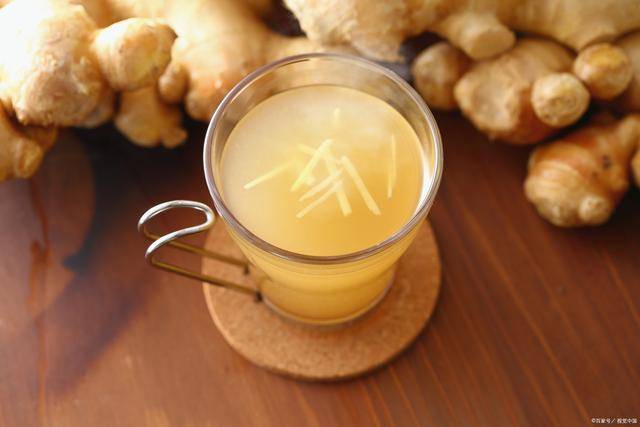Madame Li felt unwell and thought she might have caught a cold. So, she asked Xiaoling to help boil a bowl of brown sugar ginger water to warm herself up. Although Xiaoling had heard of the recipe for brown sugar ginger water, she didn’t understand the role of ginger skin, so she didn’t peel the ginger while cutting it.
Seeing Xiaoling’s actions, Madame Li quickly reminded her, “Xiaoling, you should peel the ginger, especially when making brown sugar ginger water. How come you don’t know this?” She continued, “The elders in the village always say, ‘Eating unpeeled ginger leads to a lifetime of illness.’ Ginger skin is cooling, while ginger flesh is warming. Removing the skin allows ginger to effectively ward off cold.”
Xiaoling replied dismissively, “Auntie, is it really that important to peel or not? When we cook normally, nobody bothers to peel it and we haven’t heard of any issues.” Madame Li sighed, “Oh, you young people just don’t understand. I’ll do it myself then, so the brown sugar ginger water won’t be ineffective.”
So, Madame Li personally peeled and sliced the ginger, then boiled the brown sugar ginger water. As she cooked, she explained to Xiaoling, “The elders here all say that although ginger skin is just a little part, it greatly affects the efficacy of brown sugar ginger water. Eating ginger with skin may worsen the bodily coldness.”
In our daily lives, ginger, as a common seasoning, has become an essential ingredient on many family dining tables. Ginger has anti-inflammatory, antibacterial, pain-relieving, and stomach-warming properties, benefiting human health in many ways. However, a common dilemma arises when using ginger: should the skin be peeled or not? Some believe ginger skin is rich in nutrients and should not be removed, while others insist that ginger skin has a cooling nature and should be discarded. Opinions on whether to peel ginger skin are varied, making it difficult to decide.
The nutritional value of ginger skin mainly manifests in the following aspects:
A. Nutrients in Ginger Skin
Rich in minerals: Ginger skin contains minerals such as calcium, phosphorus, iron, which are crucial for maintaining normal physiological functions and bone health.
Various vitamins: Ginger skin also contains vitamins C, B complex, which play a role in boosting immune system, maintaining neural health, and providing antioxidant properties.
Volatile oils in ginger skin: Ginger skin contains some volatile oils with anti-inflammatory, antioxidant, and antibacterial effects, positively impacting human health.
B. Medicinal Value of Ginger Skin
In traditional Chinese medicine, ginger skin is considered to have medicinal value in dispelling cold, warming the stomach and alleviating nausea. In certain cases, ginger skin is used to treat symptoms like colds and vomiting due to stomach coldness.
C. Contribution of Ginger Skin to Health
Although ginger skin has relatively fewer nutrients, retaining it appropriately can help the body better absorb ginger’s nutrients. Moreover, the volatile oils in ginger skin can enhance ginger’s aroma, improving the taste of dishes.
While ginger skin does have nutritional and medicinal value, we need to consider the potential negative impacts it may bring and how to handle ginger skin correctly.
When to Peel Ginger
Stewing soups and making brown sugar ginger water: When stewing soups or preparing brown sugar ginger water, it’s advisable to peel the ginger. The cooling nature of ginger skin might affect the efficacy of such foods, especially when brown sugar ginger water is mainly used for dispelling cold, peeling helps ginger provide warmth more effectively.
Preparing warm dishes: When preparing dishes with warm properties like ginger-scallion stir-fry or ginger-braised chicken, it’s recommended to peel the ginger to enhance its warming effects.
Making cold dishes or salads: When making cold dishes or salads, it’s fine to retain some ginger skin. The cooling nature of ginger skin won’t have adverse effects on these dishes, rather enhancing the taste and flavor.
Stir-frying: When stir-frying, you can decide whether to peel based on personal preference. If you don’t mind the taste of ginger skin or don’t have specific requirements for its cooling nature, you can keep it. However, if you prefer a purer ginger flavor, it’s suggested to remove the skin.
Consider individual constitution and needs: When using ginger, consider individual constitution and needs. For instance, if you have a cold constitution, peeling ginger can enhance its warming effects; conversely, if you have a hot constitution, retaining the skin can bring a balancing effect.
When Not to Peel Ginger
According to traditional Chinese medicine, ginger has a pungent taste, is warm in nature, and has good sweating, surface-relieving, stomach-warming, and antiemetic properties. However, “leaving the skin cools, removing it warms” is mentioned in TCM theory, indicating that ginger skin has a certain cooling nature compared to ginger flesh.
The medicinal property of ginger skin being relatively cool might affect ginger’s warming effects, especially when using ginger to treat symptoms like colds, menstrual cramps. At such times, removing the skin can enhance ginger’s warmth and provide better therapeutic effects.
However, in daily cooking, the medicinal nature of ginger skin has limited impact on dishes, and oftentimes, you can decide whether to remove based on personal taste and needs. If you enjoy the texture of ginger skin or have no specific requirements regarding its cooling nature, you can retain the skin. In certain situations like making brown sugar ginger water or warm dishes, it’s advisable to peel ginger to utilize its warming properties better.
Deciding whether to peel ginger depends on specific cooking methods, dish types, individual constitution, and needs. Additionally, the principle from traditional Chinese medicine that “leaving the skin cools, removing it warms” reminds us to pay attention to the medicinal nature of ginger skin to harness its efficacy better in practical applications.


